We all know that a good night’s sleep is essential for our overall well-being, but have you ever wondered just how important sleep really is? In this article, we will explore the significance of sleep, the consequences of poor sleep, and delve into the science behind sleep patterns. We will also introduce you to the Adelaide Sleep Test and guide you through the process of evaluating your sleep patterns using this innovative test. Finally, we will discuss how to interpret the results of your sleep test and gain a deeper understanding of your sleep patterns.
Introduction to the Adelaide Sleep Test
The sleep study Adelaide is a comprehensive evaluation designed to assess and analyze your sleep patterns. It provides valuable insights into the quality and quantity of your sleep, helping identify potential sleep disorders and guiding personalized treatment plans. Let’s explore what the Adelaide Sleep Test entails and how it can benefit you.
Quality sleep is essential for overall health and well-being. The Adelaide Sleep Test plays a crucial role in evaluating your sleep health and addressing any issues that may be affecting your rest. By undergoing this test, you are taking a proactive step towards improving your sleep quality and overall quality of life. You can visit https://resp-o-rator.com/sleep-test-australia-assessing-your-sleep-health to get more about sleep test Australia.
What is the Adelaide Sleep Test?
The Adelaide Sleep Test is a non-invasive diagnostic procedure that monitors your sleep patterns using advanced technology. It involves wearing a small device overnight that records various physiological parameters such as brain waves, eye movements, heart rate, and breathing patterns. This data is then analyzed by sleep specialists to determine the quality and characteristics of your sleep.
During the test, you are encouraged to follow your regular bedtime routine to ensure that the data collected is representative of your typical sleep patterns. The device is comfortable to wear and does not interfere with your sleep, allowing for a natural and uninterrupted monitoring process.
The Purpose of the Adelaide Sleep Test
The primary goal of the Adelaide Sleep Test is to identify any underlying sleep disorders or abnormalities that may be impacting your sleep quality. By pinpointing the specific issues, healthcare professionals can develop tailored treatment plans to address your unique sleep needs. The test results also provide valuable information for monitoring the effectiveness of interventions and making necessary adjustments.
Furthermore, the Adelaide Sleep Test can help you gain a better understanding of your sleep habits and how they may be affecting your daily life. By uncovering potential sleep disorders, you can take proactive steps to improve your sleep hygiene and overall well-being. Investing in your sleep health through the Adelaide Sleep Test is an investment in your long-term health and quality of life.
Understanding the Importance of Sleep
Getting quality sleep is crucial for our physical and mental health. During sleep, our bodies undergo various restorative processes that help regulate important bodily functions. Adequate sleep promotes brain function, improves memory and learning, and supports emotional well-being. It also plays a vital role in maintaining a healthy immune system and promoting overall longevity.
Furthermore, sleep is essential for the consolidation of memories and the processing of information gathered throughout the day. While we sleep, our brains categorize and store newly acquired knowledge, making it easier for us to recall and utilize that information in the future. This cognitive function is crucial for learning and problem-solving skills.
The Role of Sleep in Health and Wellness
Sleep is not just a time of rest; it is a time of active healing and rejuvenation. When we sleep, our bodies repair damaged tissues, synthesize essential proteins, and produce hormones that regulate growth and appetite. Inadequate sleep can lead to a variety of health issues, including cardiovascular problems, obesity, diabetes, and mental health disorders like depression and anxiety.
Moreover, sleep plays a crucial role in regulating our metabolism and energy levels. Lack of sleep can disrupt the balance of hormones that control appetite, leading to increased cravings for unhealthy foods and potential weight gain. Additionally, inadequate sleep can weaken the body’s immune response, making us more susceptible to infections and illnesses.

The Consequences of Poor Sleep
When we consistently fail to get enough quality sleep, it can have significant negative effects on our daily lives. Lack of sleep can impair cognitive function, decrease productivity, and negatively impact our mood and emotional well-being. It can also increase the risk of accidents and injuries due to decreased alertness and impaired judgment.
In addition, chronic sleep deprivation has been linked to an increased risk of developing chronic conditions such as heart disease, stroke, and type 2 diabetes. The cumulative effects of ongoing sleep deficiency can have long-term consequences on both our physical and mental health, highlighting the critical importance of prioritizing quality sleep in our daily routines.
The Science Behind Sleep Patterns
Understanding how sleep patterns work is essential for evaluating and improving our sleep quality. Sleep consists of different stages that collectively make up one sleep cycle. Each cycle typically lasts around 90 minutes, and throughout the night, we go through several cycles.
During sleep, our bodies undergo essential processes that help us rest and rejuvenate for the next day. It’s not just about closing our eyes and drifting off; our brains are actively working to regulate hormones, repair tissues, and consolidate memories. The intricate dance of neurotransmitters and neural pathways during sleep is a fascinating aspect of our body’s functioning.
The Sleep Cycle Explained
The sleep cycle consists of four stages: NREM (non-rapid eye movement) stages 1, 2, and 3, and REM (rapid eye movement) sleep. During NREM sleep, our body relaxes and prepares for deep sleep. As we progress through the stages, our brain waves slow down, and our body becomes increasingly relaxed. REM sleep, also known as dream sleep, is characterized by rapid eye movements and heightened brain activity.
Each stage of the sleep cycle plays a crucial role in ensuring that we wake up feeling refreshed and alert. NREM stages help with physical restoration, while REM sleep is essential for cognitive functions and emotional processing. The intricate interplay between these stages is what contributes to a restful night’s sleep.
How Sleep Patterns Affect Your Day
The quality and timing of our sleep patterns can significantly impact our daytime functioning. If our sleep is disrupted or inconsistent, we may experience excessive daytime sleepiness, difficulty concentrating, and decreased productivity. Understanding our sleep patterns can help identify potential sleep disorders and guide us towards better sleep habits.
Moreover, our circadian rhythm, often referred to as our internal body clock, plays a vital role in regulating our sleep-wake cycle. Disruptions to this rhythm, such as jet lag or shift work, can throw off our sleep patterns and lead to a host of health issues. By aligning our sleep schedule with our circadian rhythm, we can optimize our restorative sleep and overall well-being.

The Process of the Adelaide Sleep Test
Before undergoing the Adelaide Sleep Test, it is essential to prepare properly and understand what to expect during the procedure. This section will guide you through the necessary steps to ensure a successful and accurate evaluation of your sleep patterns.
Preparing for the Test
Prior to the Adelaide Sleep Test, it is advisable to follow specific instructions provided by your healthcare provider. These may include avoiding caffeine and stimulants, refraining from napping, and abstaining from alcohol or heavy meals close to bedtime. It is also important to create a sleep-friendly environment, ensuring your bedroom is cool, dark, and quiet.
What to Expect During the Test
On the day of the Adelaide Sleep Test, you will be asked to arrive at a designated sleep clinic or facility. A trained technician will apply sensors and electrodes to various parts of your body, including your scalp, face, chest, and legs. These sensors are painlessly attached and are designed to monitor your sleep parameters throughout the night. Once the setup is complete, you can relax and try to maintain your usual sleep routine as much as possible.
Interpreting Your Adelaide Sleep Test Results
Once you have undergone the Adelaide Sleep Test, the collected data will be analyzed by sleep specialists. This section will provide you with an overview of how to interpret and understand the results of your sleep test, allowing you to gain valuable insights into your sleep patterns.
Understanding Your Sleep Test Report
Your sleep test report will provide a detailed analysis of various sleep parameters, including sleep latency, total sleep time, sleep efficiency, and the presence of specific sleep stages like REM and NREM sleep. Sleep specialists will interpret these parameters and identify any abnormalities or patterns that may suggest sleep disorders such as sleep apnea, insomnia, or restless legs syndrome.
The Meaning of Different Sleep Patterns
Each individual has a unique sleep pattern, and understanding the significance of various sleep stages can help make sense of your sleep test results. For example, an increased amount of REM sleep may indicate a potential medical condition, while …

